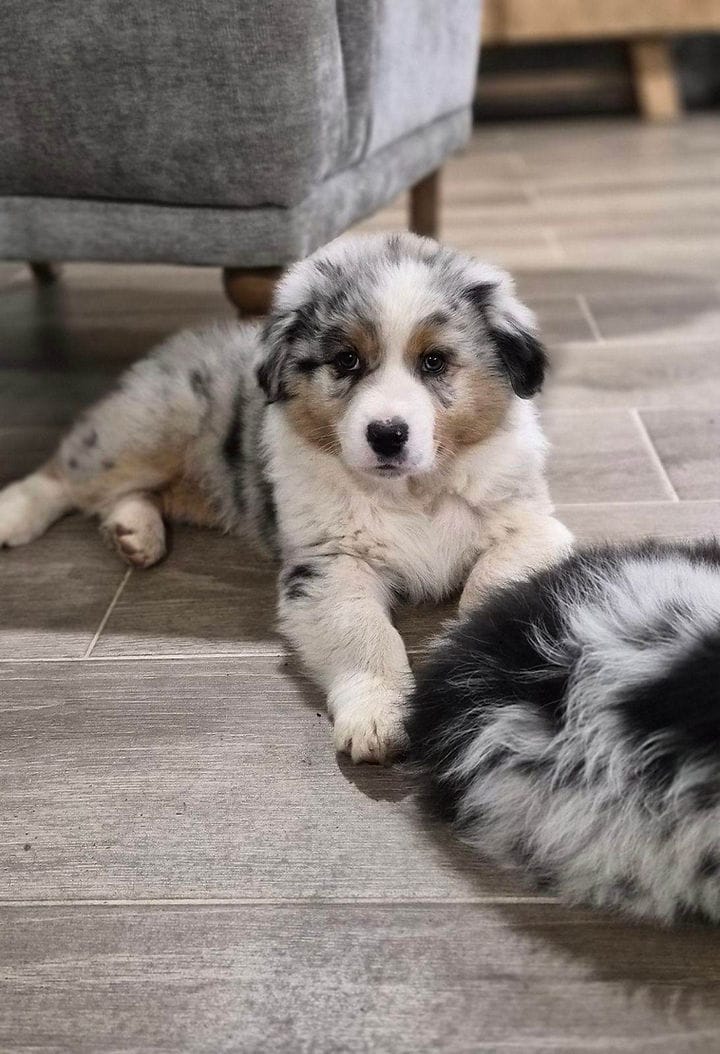Bringing a Toy Australian Shepherd into your home is an exciting prospect. These intelligent, energetic, and loyal dogs make wonderful family pets. This guide will provide essential information for prospective owners, covering what makes this breed special and how to choose the right puppy for you.
Meet Our Adorable Toy Australian Shepherds
At Shallow Creek Farm, we are passionate about raising well-socialized and healthy Toy Australian Shepherds. We have several litters available, each with unique characteristics and adorable personalities.
Upcoming Litters and Available Puppies
We have two litters due around January 1st, expecting all colors. Our current litters include:
- Sheeva: A female Toy Australian Shepherd, Blue Merle, born on 12-27-25, expected to reach 10-12 inches at maturity. She is registered with ASDR (American Stock Dog Registry). View Image.
- Sargent: A male Toy Australian Shepherd, Blue Merle, born on 12-27-25, expected to reach 10-12 inches at maturity. He is registered with ASDR. View Image.
- Starke: A male Toy Australian Shepherd, Black Tri, born on 12-27-25, expected to reach 10-12 inches at maturity. He is registered with ASDR. View Image.
- Creed: A male Toy Australian Shepherd, Red Merle, born on 12-29-25, expected to reach 11-13 inches at maturity. He is registered with ASDR. View Image.
- Crystal: A female Toy Australian Shepherd, Black Tri, born on 12-29-25, expected to reach 11-13 inches at maturity. She is registered with ASDR. View Image.
- Caddie: A female Toy Australian Shepherd, Black Tri, born on 12-29-25, expected to reach 11-13 inches at maturity. She is registered with ASDR. View Image.
Understanding the Toy Australian Shepherd Breed
The Toy Australian Shepherd, a smaller version of the Miniature Australian Shepherd, is known for its intelligence, energy, and affectionate nature. They are primarily working dogs with strong herding and guardian instincts, making them versatile and eager to please.
Character and Temperament
Toy Aussies are intelligent and trainable, often excelling in various canine activities. They are typically reserved with strangers but not shy. This breed forms a devoted bond with their families and can be excellent companions for children when properly socialized. Their energetic nature means they thrive with consistent activity and mental stimulation.
Care and Training Needs
Grooming: Toy Australian Shepherds are average shedders and require minimal grooming. Occasional brushing with a firm-bristled brush is usually sufficient, with baths only when necessary.
Training: Due to their herding instincts, early training is crucial to prevent behaviors like nipping at heels. They are highly eager to please and learn quickly, often anticipating their owner’s desires.
Activity: This breed needs daily, vigorous exercise. They enjoy long walks and playtime, and they do best when given a job to do, even if it’s just a simple puzzle toy. Consider looking into toy poodle puppies for adoption near me if you’re exploring other small breeds.
Preparing for Your New Puppy
When you adopt a Toy Australian Shepherd from Shallow Creek Farm, your puppy comes with:
- ASDR Registration
- Microchip
- Health Record
- Vaccinations (3x before leaving)
- Deworming (biweekly)
- Vet Health Certificate
- Potty training started
- Two-Year Health Guarantee
We offer various delivery options, including local driving, meeting at our farm, air transportation, and ground transportation.
Financing and Next Steps
We understand that bringing a new puppy home is a significant decision. We offer financing options to make it easier.
Ready to find your perfect companion?
- Read our Policies: https://screekfarm.com/policies/
- Contact Us to reserve: https://screekfarm.com/contact-us/
- Sign up for new litter notifications: https://screekfarm.com/#signup
- Explore financing: https://screekfarm.com/financing-available/
We encourage you to explore our gallery of previous puppies to see the joy these dogs bring to their families. If you are considering other breeds, you might also be interested in mini aussie shepherd puppies for sale near me or blue merle miniature australian shepherd puppies for sale near me. We also have listings for blue merle mini australian shepherd for sale near me and mini toy aussie for sale near me.
Choosing a Toy Australian Shepherd means welcoming a smart, loving, and active member into your family. With proper care and training, your Toy Aussie will be a cherished companion for years to come.

